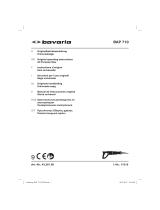
GB
- 23 -
saw blade (12) into the blade holder (14) as
far as the stop (Fig. 3). The teeth on the saw
blade must be pointing forwards.
•
Allow the blade holder (14) to slide back to
starting position. The saw blade (12) must sit
in the guide roller (10).
•
Check that the saw blade (12) is securely
mounted in the blade holder.
•
To remove the saw blade, follow the instruc-
tions above in reverse order.
5.3 Installing the parallel stop (Fig. 4/Item 11)
•
The parallel stop (11) enables you to saw
parallel cuts.
•
Undo the two locking screws (13) on the so-
leplate (7).
•
Now slide the parallel stop (11) into the
guides on the soleplate (7). You can fit the
parallel stop (11) on either the left or right of
the equipment.
•
The guide strip must always face downwards.
Set the required distance using the measu-
rement scale on the parallel stop (11) and
tighten the locking screws (13) again.
5.4 Setting the soleplate for miter cuts (Fig. 5)
•
Undo the locking lever (16) on the soleplate.
•
Pull the soleplate (7) slightly forward. The so-
leplate can now be swiveled a maximum 47°
to the left and right.
•
If the soleplate (7) is pushed back to the
rear again it will only function in the locking
positions at 0°, 15°, 30° and 45°, which are
marked on the graduated scale for the sole-
plate (9). Move the soleplate into the required
position and refasten the locking lever (16).
•
However, the soleplate (7) is also easily set
to another angle. To do so, slide the soleplate
(7) forwards, set the desired angle and refas-
ten the locking lever (16).
Note! For miter cuts you must remove the locking
screws for the parallel stop (13) and the splinter
guard (17).
5.5 Adapter for dust extraction system
(Fig. 6/Item 5)
•
Connect your jigsaw to a vacuum cleaner
using the adaptor for dust extraction (5). This
will ensure optimum dust extraction from the
workpiece. The benefits are that you will pro-
tect both the equipment and your own health.
Your work area will also be cleaner and safer.
•
Dust created when working may be dange-
rous. Refer to the section entitled “Safety
information”.
•
Fit the adapter (5) as shown in Fig. 6. The
adapter (5) must audibly engage to ensure
that it is secure in the soleplate (7). The adap-
ter for chip extraction (5) cannot be used for
miter cuts.
•
Fit the vacuum tube of the vacuum cleaner
onto the adaptor opening (5). Check that the
connections are air-tight.
5.6 Line guide (Fig. 7-9/Item 6)
Using the line guide (6) you can carry out exact
cuts following cutting lines marked on the work-
piece. Fit the line guide by mounting it on the top
of the soleplate (7) and letting it lock in place at
the bottom, as shown in Fig. 7. Use the mark (a)
for the 0° angle setting (Fig. 8) and the mark (b)
for the 45° angle setting (Fig. 9). See point 5.4 for
information about the angle setting.
Important! Carry out a trial cuts in a piece of
waste wood.
5.7 Splinter guard (Fig. 10/Item 17)
The splinter guard ensures that the material you
want to cut does not splinter or crack during sa-
wing. Insert it into the soleplate from underneath
as shown in Fig. 10.
Note! The splinter guard can be used only for 0°
cuts and must be removed for miter cuts up to
47°!
5.8 Charging the Li battery pack (Fig. 11-12)
1. Remove the battery pack (d) from the handle,
pressing the pushlock button (c) downwards
to do so.
2. Check that your mains voltage is the same as
that marked on the rating plate of the battery
charger. Insert the power plug of the charger
(e) into the mains socket outlet. The green
LED will then begin to fl ash.
3. Push the battery pack onto the battery char-
ger.
In section 10 (Charger indicator) you will fi nd a
table with an explanation of the LED indicator on
the charger.
If the battery pack fails to charge, check for the
following:
•
voltage at the power socket
•
whether there is good contact at the charging
contacts of the charging unit
Anl_TE_JS_18_Li_SPK7.indb 23Anl_TE_JS_18_Li_SPK7.indb 23 06.11.15 09:5406.11.15 09:54















